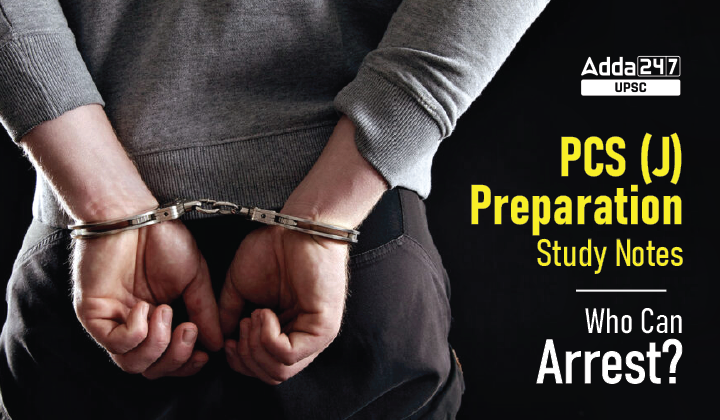Table of Contents
Who can arrest?
The arrest can be made by police, magistrate and even a private person. Section 41(1) CrPC Says:
- Any police officer- may without an order from a magistrate and without a warrant arrest any person who has committed a cognizable offence,
- who is in possession of stolen property, or
- is a state offender,
- who obstructs a police officer in discharge of his duty,
- who attempts to escape from lawful custody,
- who is declared as a deserted from any of the Armed Forces of the Union,
- who is a released convict and breaches his contract of release etc.
- Section 42 authorizes a police officer to arrest a person for an offence which is non-cognizable if the person to be arrested refuses to give his name and residence.
- Section 43 gives the right to a private person like you and me to carry out an arrest of a person who in his presence commits a cognizable or a non-bailable offence or who is a proclaimed offender.
- Section 44 arrest by magistrate as per section 44(1) of CrPC, the Magistrate has been given the power to arrest an individual who has committed an offence in his presence and also commit him to custody.
- However, CrPC exempts the members of Armed forces from being arrested for anything done by them in discharge of their official duties except after obtaining the consent of the government (section 45 CrPC).
- Section 46 of CrPC explains how arrest is made with or without warrant. Section 46(4) special protection as females, that forbids arrest of women after sunset and before sunrise, except in exceptional circumstances in which case the arrest can be done by a woman police officer after making a written report obtaining a prior permission from the concerned judicial magistrate of first class within whose local jurisdiction the offence is committed or the arrest is to be made.
कौन गिरफ्तार कर सकता है?
गिरफ्तारी पुलिस, मजिस्ट्रेट और यहां तक कि एक निजी व्यक्ति द्वारा भी की जा सकती है धारा 41(1) सीआरपीसी कहता है:
- कोई भी पुलिस अधिकारी- मजिस्ट्रेट के आदेश के बिना और वारंट के बिना संज्ञेय अपराध करने वाले किसी भी व्यक्ति को गिरफ्तार कर सकता है,
- जो चोरी की संपत्ति के कब्जे में है, या
- एक राज्य अपराधी है,
- जो एक पुलिस अधिकारी को उसके कर्तव्य के निर्वहन में बाधा डालता है,
- जो कानूनी हिरासत से भागने का प्रयास करता है,
- जिसे संघ के किसी भी सशस्त्र बल से निर्जन घोषित किया गया हो,
- जो रिहा किया गया अपराधी है और रिहाई आदि के अपने अनुबंध का उल्लंघन करता है।
- धारा 42 एक पुलिस अधिकारी को किसी ऐसे व्यक्ति को गिरफ्तार करने के लिए अधिकृत करती है जो गैर-संज्ञेय है यदि गिरफ्तार किया जाने वाला व्यक्ति अपना नाम और निवास बताने से इनकार करता है।
- धारा 43 आपके और मेरे जैसे निजी व्यक्ति को किसी ऐसे व्यक्ति की गिरफ्तारी करने का अधिकार देती है जो उसकी उपस्थिति में संज्ञेय या गैर-जमानती अपराध करता है या जो घोषित अपराधी है।
- सीआरपीसी की धारा 44(1) के तहत मजिस्ट्रेट द्वारा धारा 44 की गिरफ्तारी, मजिस्ट्रेट को किसी ऐसे व्यक्ति को गिरफ्तार करने की शक्ति दी गई है जिसने उसकी उपस्थिति में अपराध किया है और उसे हिरासत में भी ले सकता है।
- हालांकि, सीआरपीसी सशस्त्र बलों के सदस्यों को सरकार की सहमति (सीआरपीसी की धारा 45) प्राप्त करने के अलावा अपने आधिकारिक कर्तव्यों के निर्वहन में उनके द्वारा किए गए किसी भी काम के लिए गिरफ्तार होने से छूट देता है।
- सीआरपीसी की धारा 46 बताती है कि गिरफ्तारी वारंट के साथ या बिना वारंट के कैसे की जाती है। महिलाओं के रूप में धारा 46(4) विशेष सुरक्षा, जो सूर्यास्त के बाद और सूर्योदय से पहले महिलाओं की गिरफ्तारी पर रोक लगाती है, असाधारण परिस्थितियों को छोड़कर, जिसमें एक महिला पुलिस अधिकारी द्वारा संबंधित से पूर्व अनुमति प्राप्त करने के बाद एक लिखित रिपोर्ट करने के बाद गिरफ्तारी की जा सकती है। प्रथम श्रेणी का न्यायिक मजिस्ट्रेट जिसके स्थानीय अधिकार क्षेत्र में अपराध किया गया है या गिरफ्तारी की जानी है।



 TSPSC Group 1 Question Paper 2024, Downl...
TSPSC Group 1 Question Paper 2024, Downl...
 TSPSC Group 1 Answer key 2024 Out, Downl...
TSPSC Group 1 Answer key 2024 Out, Downl...
 UPSC Prelims 2024 Question Paper, Downlo...
UPSC Prelims 2024 Question Paper, Downlo...






